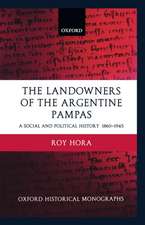British West Indian Slavery, 1750-1834: The Process of Amelioration
Autor J. R. Warden Limba Engleză Hardback – 25 aug 1988
Preț: 1110.80 lei
Preț vechi: 1689.32 lei
-34% Nou
Puncte Express: 1666
Preț estimativ în valută:
212.58€ • 230.83$ • 178.56£
212.58€ • 230.83$ • 178.56£
Carte tipărită la comandă
Livrare economică 11-17 aprilie
Preluare comenzi: 021 569.72.76
Specificații
ISBN-13: 9780198201441
ISBN-10: 0198201443
Pagini: 336
Ilustrații: 13 figures, 39 tables
Dimensiuni: 150 x 30 x 250 mm
Greutate: 0.57 kg
Editura: Clarendon Press
Colecția Clarendon Press
Locul publicării:Oxford, United Kingdom
ISBN-10: 0198201443
Pagini: 336
Ilustrații: 13 figures, 39 tables
Dimensiuni: 150 x 30 x 250 mm
Greutate: 0.57 kg
Editura: Clarendon Press
Colecția Clarendon Press
Locul publicării:Oxford, United Kingdom
Recenzii
'Ward's book takes its place as a necessary reference point in the long-running debate on "capitalism and slavery".'Times Literary Supplement
'careful, well-documented, and significant study ... in the areas on which it concentrates ... it brings forward very valuable evidence and arguments'Michael Tadman, University of Liverpool, Business History
'careful, well-documented, and significant study'Tom Donnelly, Coventry Polytechnic, Business History
'a well-researched and well-written study of both the short- and long-term changes in sugar planting ... It is difficult in the short space allotted to this review to do justice to the penetrating analysis and fine judgment displayed by the author.'Richard B. Sheridan, University of Kansas, Lawrence, Slavery & Abolition
'careful, well-documented, and significant study ... in the areas on which it concentrates ... it brings forward very valuable evidence and arguments'Michael Tadman, University of Liverpool, Business History
'careful, well-documented, and significant study'Tom Donnelly, Coventry Polytechnic, Business History
'a well-researched and well-written study of both the short- and long-term changes in sugar planting ... It is difficult in the short space allotted to this review to do justice to the penetrating analysis and fine judgment displayed by the author.'Richard B. Sheridan, University of Kansas, Lawrence, Slavery & Abolition



















